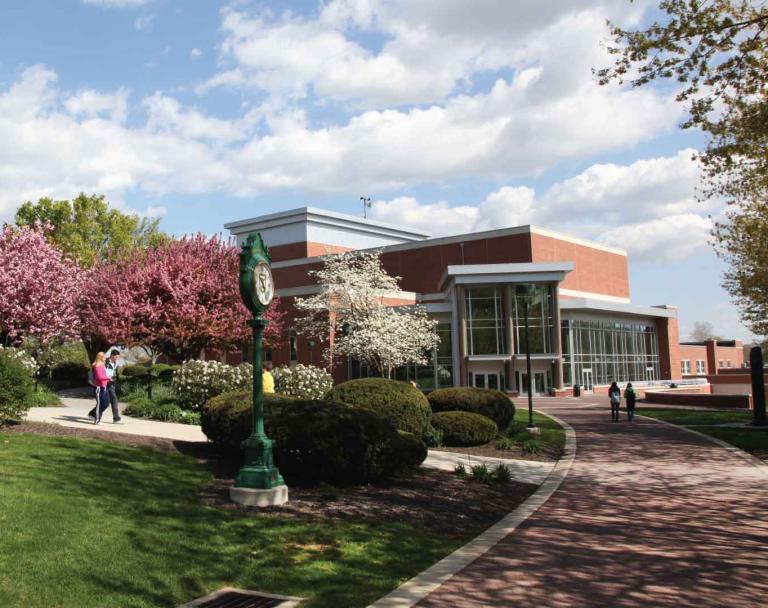Stephanie Mace

Public Relations grad’s journey includes innovating processes for Federal agencies
Stephanie (Obadia) Mace ’03 remembers turning the TV on with her roommates and watching the first of the Twin Towers fall on 9/11. “We all just felt numb,” she recalls. “You wondered if what you were seeing was real. How could it be happening?”
Mace walked to her Public Relations class and remembers watching with her York College of Pennsylvania classmates as the second tower fell. She cried. She was afraid for her family, which were living near Washington, D.C., and wondered if they were safe.
But, what impacted her the most was then stepping into her Crisis Communications class and using the very real experience of the terrorist attacks to figure out how to navigate the heartache and turmoil that was left behind.
“It was a real-life introduction to what would happen in a crisis,” Mace says. “It was the toughest thing I ever experienced in college from an educational standpoint, but it’s also one of the most awesome memories I continue to talk to my former classmates about. It changed who we were.”
A career that helps
That experience catapulted Mace to pursue government communications work. She was hired as a Communications Specialist at a PR firm contracted to help the newly formed Department of Homeland Security. Under a program called US-VISIT, Mace was part of a team who would help communicate the new biometric entry/exit regulations and help educate people about the process and what happened behind the scenes to make sure people of interests were not able to enter ports of entry. This fingerscanning technology would have prevented the known terrorists from being able to fly on 9/11.
“The Do Not Fly list was meant to catch people who wanted to do bad things, but it also led to profiling certain people,” Mace says. “We had to work on outreach and communications so people knew that the intentions of this program were to protect our citizens and we had to learn how we could make people comfortable with sharing their biometric information.
In this role, Mace drew on her own family’s experience. As the daughter of French immigrant parents, Mace remembers having to translate for her mom and dad. She tried to see the policies and procedures from their perspective and learn how to help people understand the benefits of new security measures.
While she attended congressional briefings, discussed interagency partnerships and prepared talking points on behalf of DHS, Mace also had to have her suitcase packed at all times. She visited every port of entry along the southern border, which opened her eyes to how important it was to hear every voice and gather different perspectives.
Working with the same firm, Mace was assigned to projects such as a hydro relicensing project, where more than 200 people voiced their opinions on a hydro plant being placed in the Carolinas. She also managed an e-Commerce project with the U.S. Patent and Trademark Office, conducting trainings and distributing outreach materials for a transition from a paper to digital patent filing system.
“These were all steps in a career that was very exciting and meaningful for me,” she says. “I felt like I was using skills that were instilled in me in the classroom, and I was growing into a person I was really proud of.”
Changing her path
After freelancing as a communications consultant and taking some time to raise her two daughters, Mace was ready to relaunch her career. She joined a start-up which worked with Veterans Affairs to interview veterans on how to better communicate with them through the VA’s website and apps.
“I will never be able to code,” Mace says, laughing, “but I was the person who got the necessary information so the developers knew what to build. We had to get those details nailed down so we could provide something helpful to the veterans using it.”
After doing remote work for about a decade, Mace found an opportunity to take on an exciting endeavor with a woman-and-minority-owned company called Avid Core. Launched in 2020 by Virginia Quiambao and Amanda Roberts, Avid Core is a strategic communications firm focused on responsibility and sustainability for federal agencies and large infrastructure projects.
As Vice President of Digital Services, Mace works on finding innovative and strategic partners to modernize government processes. She’s also helping to lead the conversation on Diversity, Equity and Inclusion (DE&I), as Avid Core is dedicated to bringing those who are underrepresented to the table to have their voices heard.
“I’m reminded every day that I still want a world that is safer and better for everyone,” she says. “York College really gave me a strong foundation to go out and make a difference so that future generations don’t have the worries that we do now. I want to be able to make things better for the world my daughters will live in, and I’m hoping the work I do reflects that.”

